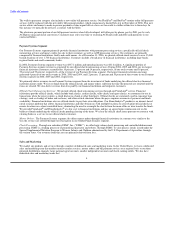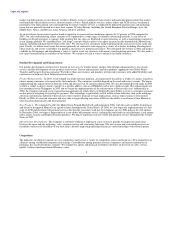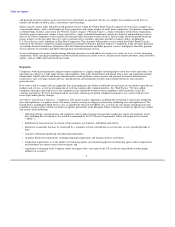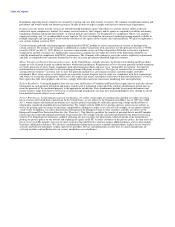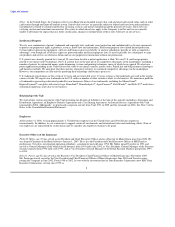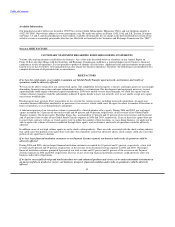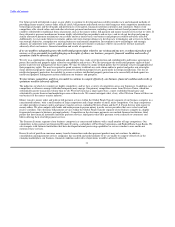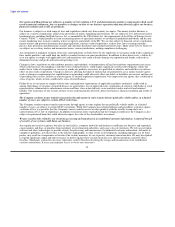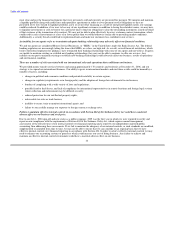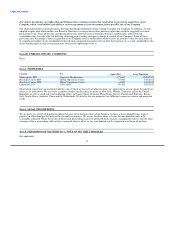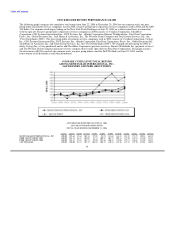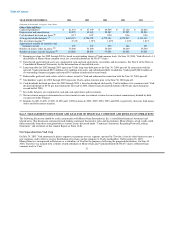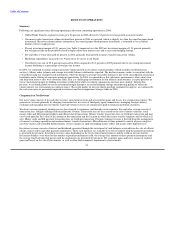MoneyGram 2006 Annual Report Download - page 17
Download and view the complete annual report
Please find page 17 of the 2006 MoneyGram annual report below. You can navigate through the pages in the report by either clicking on the pages listed below, or by using the keyword search tool below to find specific information within the annual report.
Table of Contents
Litigation or investigations involving our agents or MoneyGram which could result in material settlements, fines or penalties may
adversely affect our business, financial condition and results of operations.
Our business has in the past been, and may in the future continue to be, the subject of class actions, regulatory actions, investigations or
other litigation. The outcome of class action lawsuits, regulatory actions or investigations is difficult to assess or quantify. Plaintiffs or
law enforcement agencies in these types of lawsuits or investigations may seek recovery of very large or indeterminate amounts, and the
magnitude of these actions may remain unknown for substantial periods of time. The cost to defend or settle future lawsuits or
investigations may be significant.
There may also be adverse publicity associated with lawsuits and investigations that could decrease customer acceptance of our agents
and our services. As a result, litigation or investigations involving our agents or MoneyGram may adversely affect our business, financial
condition and results of operations.
We are subject to credit risk related to our investment portfolio and our use of derivatives.
Our credit risk includes the potential risk that the Company may not collect on interest and/or principal associated with its investments, as
well as counterparty risk associated with its derivative financial instruments. Approximately 89 percent of our investment portfolio at
December 31, 2006 consisted of securities that are not issued or guaranteed by the U.S. government. If the issuer of any of these
securities were to default in its payment obligations to us or to otherwise experience credit problems, the value of the investments would
decline and adversely impact our investment portfolio and our earnings. At December 31, 2006, we were party to derivative instruments,
known as swaps, having a notional amount of $2.6 billion. These swap agreements are contracts in which we and a counterparty agree to
exchange periodic payments based on a fixed or variable rate of interest on a given notional amount, without the exchange of the
underlying notional amounts. The notional amount of a swap agreement is used to measure amounts to be paid or received and does not
represent the amount of exposure to credit loss. At any point in time, depending upon many factors including the interest rate
environment and the fixed and variable rates of the swap agreements, we may owe our counterparty or our counterparty may owe us. If
any of our counterparties to these swap agreements were to default in its payment obligation to us or otherwise experience credit
problems, we could be adversely affected.
Our financial condition and results of operations could be adversely affected by fluctuations in interest rates.
We derive a substantial portion of our revenue from the investment of funds we receive from the sale of payment instruments, such as
official checks and money orders, until these instruments are settled. We generally invest these funds in long-term fixed-income
securities. We pay the financial institutions to which we provide official check outsourcing services a commission based on the average
balance of funds produced by their sale of official checks. This commission is generally calculated on the basis of a variable rate based on
short-term financial indices, such as the federal funds rate. In addition, we have agreements to sell, on a periodic basis, undivided
percentage interests in some of our receivables from agents at a price that is discounted based on short-term interest rates. To mitigate the
effects of interest rate fluctuations on our commission expense and the net proceeds from our sales of agent receivables, we enter into
variable-to-fixed rate swap agreements. These swap agreements require us to pay our counterparty a fixed interest rate on an agreed
notional amount, while our counterparty pays us a variable interest rate on that same notional amount.
Fluctuations in interest rates affect the value and amount of revenue produced by our investment portfolio, the amount of commissions
that we pay, the net proceeds from our sale of receivables and the amount that we pay or receive under our swap agreements. As a result,
our net investment revenue, which is the difference, or "spread," between the amount we earn on our investment portfolio and the
commissions we pay and the discount on the sale of receivables, net of the effect of the swap agreements, is subject to interest rate risk as
the components of net investment revenue are not perfectly matched through time and across all possible interest rate scenarios.
Certain investments in our portfolio, primarily fixed-rate mortgage-backed investments, are subject to prepayment with no penalty to the
borrower. As interest rates decrease, borrowers are more likely to prepay fixed-rate debt, resulting in cash flows that are received earlier
than expected. Replacing the higher-rate investments that prepay with lower rate investments could reduce our net investment revenue.
Conversely, an increase in interest rates may result in slower than expected prepayments and, therefore, cash flows that are received later
than expected. In this case, there is risk that the cost of our commission payments may reprice faster than our investments and at a higher
cost, which could reduce our net investment revenue.
14


